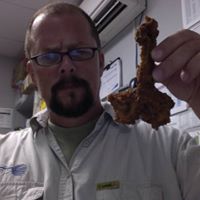Leaderboard
Popular Content
Showing content with the highest reputation on 10/27/2011 in all areas
-
I was recently having a debate with another member about wages. I won't get into the local details, but here in Alberta, the city wages are nearly frozen while the rural wages are skyrocketing. This is a result of the entire province unionizing. Previously, the City's were great paying jobs, and the rural staff barely scraped by. So we are really just equalizing wages at this time, which is really upsetting the City medics. So the opinion that I have found quite common coming from the city medics, is that us rural workers do not do enough calls to warrant wage parody with the city workers. My opinion is: we should be paid based on education and job title, NOT call volume. We do entirely different jobs. eg: A city worker may do 2 ETOH, a code, and a chest pain in 1 - 12 hr shift, then go home and shut the radio off for the night. Last tour I did a 7hr old female with increased ICP that had to be rescusitated, then managed for the 3.5hr transport, then go home and remain "on call" for the next 48hrs straight. True enough, that may be the only call I do, but why should my annual income be any different than a city workers? We do totally different jobs.1 point
-
The problem I have with the OWS protesters is that they are a group of the most dependent, tech-crippled group ever. No generation ever more in history has depended on the service industry to supply their basic needs. At any time any one of them could get a group of friends together and form a socialist based subsistence agriculture commune. They used to do it in the 1960's all the time. But then there would be no Twitter, no Xbox, no iPhone. They are absolute hypocrites. They are the generation that wasn't ever allowed to use a knife or climb a tree or keep score in baseball. Give up those things first, then talk to me about making a change.1 point
-
Hello all i am new here I was wondering what are the aspects of the backround checks and medical checks on future ems employees? Several years ago i was hospitalized for personal issues in my late teens and collected disability and i currently take a small dosage of sleeping medicine for sleep apnea and a adrenal gland(not life altering or effecting) I am now currently in school and 1 month away from taking my state exam for the emt-B cert I can do normal tasks and focus with no issues my past medical issues do not any longer effect my every day living. I just do not want to be discriminated in the future if i try to get a job for 911/fdny or any other ems branches. due to me being in a psych years ago and and at once being on disability. what are the fellow members thoughts on what i should do. 7 year clean driving record no criminal history1 point
-
Interesting thread. Makes you say, "hmmm". The short answer to your question is, "I don't know". I'll have to ask when I go on shift next. However, should we as individuals be disclosing that information? I do not believe that is our place. That decision belongs to our Chief and Medical Director. What we should be doing is disclosing accurately in our reports what occurred. Let me repeat...accurately. Just curious in the example you have cited. Were you there (the partner) or is this hearsay? Other signs/symptoms that would lead the medic to believe coronary and not trauma related as the patient stated? Did the patient decide that he wanted to go POV and the team just jumped on it or did they encourage the refusal themselves? Regardless of which path, did they encourage the patient to go immediately and he delayed (you said 2.5 hours)? I'd really like to see more detail before we hang this crew... I've said it before and I will say it again. EMS is not an exact science and mistakes will be made. It's how we deal with those mistakes that defines us.1 point
-
If you are not willing to throw down $500.00 for an iPad 2, hold out for the new Kindle Fire. It will only set you back $200.00 and has an amazing package of goodies to offer. While I absolutely love my iPad, the Fire looks to be a solid device with an impressive set of features. Not to mention the solid reputation of Amazon. Heck, even as an iPad user, most of my ebooks are read via the Kindle app and not through iBooks. http://www.youtube.com/watch?v=jZ29t8eHv4g&feature=youtube_gdata_player1 point
-
1 point
-
This is a good discussion. First and foremost, there should be no pay per call in EMS; not ever, it is utter bullshit. As was mentioned before in this discussion just ask how well that is working out for B.C. paramedics. To add some context to my opinion, I will admit to working in a busy urban system in Alberta with a population of over a million (whoop-de-fucking-do), but with less than thirty murders this year. I must disagree with Stiffaliss comment that wage have stagnated and gone down for some paramedics, with the new receiving agreement, there have been modest wage increases across the board, personally, as a one year paramedic, my wage jumped about $3/per hour. The EMT's are seeing slightly lower wages than before, but those who were making more before the transfer were red circled, meaning their pay stays frozen until the wage scale catches up with them. So, although new hire EMT's may make less than before, no one actually has had wages clawed back from them. Personally, I think it rocks that rural services now get the same wages as their urban counterparts. Since the system is not set up to pay by the call (nor should it be), the argument that urbans work harder, hence should get paid more is moot. My argument for parity is this: Urbans Paramedics work busier shifts, and have to be at the hall for their entire 10-14hr shift, but get to go home at the end of the day, turn their radio off, have a beer, drive out of town, etc. Rural paramedics on the other hand have less call volume, but typically are on call of 48-96 hrs straight, and have radios turned on, can't drink, can't leave town, etc. So both parties make a significant commitment to their job, and should be paid accordingly. Additionally, before anyone jumps on my back, saying "Oh you've just worked urban, you don't know what rural is like." I did work for about two years in a town with 3500 citizens (hopefully this is small enough to be considered TRUE rural). As Tnuigs pointed out, this divide and conquer technique is very real within the AHS management, and we really do need to present a unified front, because I think we are going to see some low ball tactics and bad faith negotiation practices from AHS, particularly as the next round of contract negs get underway.1 point
-
I understand your fears amigo. Many, many people have things in their past that are less than ideal. There are many behavioral conditions that are frequent in the teen years that would not be considered relevant many years later. I would think that a clean criminal record, drug screen and a passed physical would be all they would ask for but that could differ from company to company. The only other advice is only answering the questions they ask specifically. A employer will ask the questions they are interested in having answers to. If they don’t ask it is because they are not interested in knowing. If they ask give them a truthful, specific answer. Don’t hide anything or lie. Don’t volunteer information they don’t ask for. You should be fine.1 point
-
As perhaps the most vocal FDNY EMS Command person on this site (retired, for a year and 3 weeks, now), I don't know what to tell you. I've been a diagnosed Acute Sleep Apnea patient, using a C-PAP for years (treating with meds? New to my understanding). In disclosure, I was already a Member Of Service (MOS) prior to being diagnosed with the ASA. You might want to Google Sleep Apnea groups for further information on that aspect. Understand that I was "Grandfathered" in to the FDNY, when the Mayor decided that the NYC Health and Hospitals Corporation couldn't handle us (the EMS), but wouldn't give us "3rd Service" status. A sore point, but I'll argue that in a different string to itself. As I understand it, when one applies to the FDNY, for either EMT, Paramedic or Fire Fighter status, the physical training will be geared towards the applicant becoming a Fire Fighter. There will also be a "Psych" test. While I cannot give any specific recommendation, I am aware that there are numerous agancies that can, and will, for a price, give you both written and physical test preparation. You can probably Google a few, but as with a bunch of "stuff" on the internet, Caviat Emptor. Good luck.1 point
-
I don't think that our pay should be based on our call volume, but I do think that there should be incentive pay after a certain number of calls and even an incentive of some form (be it a bonus towards training, mandatory training days, extra pay, etc) after so many days without calls too. The truth is, most of us aren't even making enough to make it worth it to even sit around doing anything. At least, I don't think so. All of the time you spend sitting there doing nothing is time you could be dedicating towards other, more profitable ventures, but you likely can't do that either while sitting at a station all day (depending on how good your service's internet is!). Not to mention, there's the problem of retention and skills upkeep in a rural environment that have to be addressed. I personally get antsy if I don't run at least four calls in a 12 hour period, preferably more like six plus. Going an entire shift without running a single call is torture for me. While I know there are some folks who are more than happy to sit around making money doing nothing, I prefer to think that most of us got into EMS because we like to run calls, and in combination with low pay the low call volume of a lot of rural services can drive EMTs and paramedics away, which worsens the quality of the service overall. I know a lot of people say that their counties/cities/regions can't afford a paid department, but honestly, the money's got to be found somewhere. EMS is an essential service, and everyone deserves to have a highly motivated, highly trained and educated crew available to them when they have an emergency. Pay per call is simply not able to deliver that in a low volume, rural area oftentimes, I don't believe. As for volunteer EMS, that's a whole 'nother soapbox of mine!1 point
-
I did not intend for my posts to reflect the idea that a rural provider is "better" in any way. I will admit though, they soon got that way as I was typing through anger in response to the assumption that rural medics have weaker skills or less competence due to low call volume. I think rural and urban providers have very different jobs. For the most part an urban provider faces high call volumes, violence, long hallway waits, and degredation from patients. (feel free to correct me if I am wrong as I have never worked in a city over a million people) A rural provider faces: Treating friends/neighbors on a regular basis, long transfers with/without critical care, lack of resources, living the "lifestyle" of on-call. Of course we each have perks too. The question of wages should not be based on call volume alone, when we obvioustly have such different jobs. The wages must be set for certifications/diploma/degree. If we start setting wages based on calls, based on the idea that more calls = stronger skills, then why wouldent we be paid per skill used per call? The answer is simple... this is not a "trade", this is a profession, and you are paying me for my education.1 point
-
I'm not sure about NY state but here in CA, AZ, and NV, to be hired, you have to pass a physical exam by a doc. Anything that would hinder your ability to drive or be considered an unsafe condition for driving would pose an issue. From the sound of your situation, that won't be an issue. Most important is your ability to show up to work when scheduled and be able to lift 200+ lbs. safely1 point
-
I am not sure your medical records as a minor will show up, and I am not sure why they would ask that before interview. Usually, health questions are something you answer for your health insurance application after you are hired. With that being said, they do have to make sure you are fit enough to do the job, and will usually require a physical. If asked, I would just disclose any current medical problems to the Physician who is examining you.1 point
-
That is why I got my CHL. Always thought I would feel dumb to reach the pearly gates having been murdered only for God to say "I made it legal for you to carry and you refused".1 point
-
in reality, the whole metro/rural EMS is just an extension of the whole city v's country shite that runs in every day life, usually propgated by people who have either lived in or worked in only one of those environments yet has a "solid" opinion absed on conjecture and what a friend of a friend told them1 point
-
I used to assume that rural providers were weaker providers due to lack of experience, but after some discussion on here over the years, my opinion may have changed. Sure, more urban providers run more calls, but how much do they get to do in the time they have? When I was a volley we were 7 minutes from the ER, 12 minutes during rush hour. Treatment was started on scene but the pt was quickly moved to the ER. I did 1 ride along with NYC EMS (I know, huge n of 1) and it seemed like that cardiac arrests were worked on the scene and everyone else was worked in the ambulance enroute to the ER. Rural providers may not have the volume of calls but they spend a lot more time with the pt. When they get a critical pt, they have to be able to manage them for longer periods of time. So, which is more important, volume of calls or time spent managing pts? I don't think I have an aswer.1 point
-
Let me start by saying that I don't have recent experience in this system. I don't want to post my identity on the forum, but if anyone wants to pm me, I'll be happy to chat more candidly. I agree with squint that there's an element of "divide and conquer" here. As long as providers are fighting each other, they're not organising for the common good. Whatever inequities exist in the system, they won't be solved by one rural line medic and one city line medic arguing over who's got the better skills. Just as the various FD and EMS system clashes in the past were never fixed by two front-line providers getting in each other's way on a call. I think that the rural providers have been historically underpaid. It's good to see their wages brought up to par. If this has had to happen at the cost of stagnation in the bigger centers, then that's a shame, and obviously undesirable. I imagine a positive with this change is that it must now be possible to leave the city after 10 years, go to a quieter rural service, and not have to take a huge pay cut. In the past a lot of the senior guys would have had to take a huge hit to do this. I'm a little biased towards the urban providers, I have to admit. I also agree with squint where he suggests that there's a lack of a real critical care level in AB. It seems a little silly to have AOCPs including Swan-Ganz monitoring, ABG analysis and x-ray interpretation when very very few providers have had more than a few hours of training in these areas, have more than a cursory understanding, and are unlikely to be exposed to them on anything approaching a regular basis. Is running a transfer to the city with an intubated patient and a pressor running critical care? Maybe. But then, is doing a 12-lead, and giving tenecteplase, plavix and enoxaparin critical care? Perhaps. Because that's been done in the big city for 10 years now. My experience has been that any system has it's five percenters. This even includes STARS. I can't argue if the average rural medic is better, or the average city medic (I could accept the argument that the average STARS medic might be). They're different roles. I can understand the frustration of flexing all over Planet Earth, doing hallway nursing and running inner city calls. I can also see how working rural, doing LDTs for patients with antibiotics hung, and being on call when you get home can be pretty tiring too. It will be interesting to see how AHS manages to attract providers to the less desirable services / positions, now that they can't simply raise the wage for a given region. I'm woefully out of touch with the current situation, however my suggestion would be that the best thing for EMS in AB would be to increase educational hours, and extend the training for both EMTs and paramedics. Move to a Bachelor's degree program, as the RNs did, and provide a more solid basis for clinical practice. If I recall, paramedic training has been 2 years since the early 80s. And despite all the scope of practice changes, and increasing responsibility, it hasn't been extended a day since. This would seem to be a critical issue to address. As an aside, regarding the skills argument. Obviously competency is a range. It's not a binary outcome. Some people are more competent than others, and will find themselves at different places within that continuum. There's been studies suggesting that cardiac arrest survival is higher when patients are intubated by providers with > 25 ETIs in the last 5 years [1]. This is obviously subject to a lot of confounders, and some of the odds ratios are a little sketchy There data showing that paramedic students success rate improves as they intubate more patients, and they suggest a minimum number of ETIs for initial training is ~ 25 intubations / student [2]. This is probably fairly intuitive. It's also been shown that paramedics that intubate more frequently have higher success rates [3]. There have also been many reported studies discussing the effects of restricting intubations for paramedics who perform less than 6-12/year [4][5]. A decay in intubation skills following paramedic training has also been described [6]. It's not like this hasn't been investigated, although obviously it could use some further study. Without straying too far off topic, skill decay and retention may be a particular problem for the rural paramedic [7], but is also an issue in the urban setting. I'm sure there are city medics who aren't intubating 6 times a year (and six times a year might not be enough, especially if the success rate is 0%, or the patients are traumatised / subject to excessive hypoxia / hypercapnia, etc.). This is why there should be a good quality control and continuing education program in place to meet the needs of providers that aren't getting sufficient exposure to skill practice. All the best. [1] Wang HE, Balasubramani GK, Cook LJ, Lave JR, Yealy DM.Out-of-hospital endotracheal intubation experience and patient outcomes. Ann Emerg Med. 2010 Jun;55(6):527-537.e6. Epub 2010 Apr 14. Link: http://www.ncbi.nlm.nih.gov/pmc/articles/PMC3071147/?tool=pubmed [2] Warner KJ, Carlbom D, Cooke CR, Bulger EM, Copass MK, Sharar SR.Paramedic training for proficient prehospital endotracheal intubation.Prehosp Emerg Care. 2010 Jan-Mar;14(1):103-8. [3]Garza AG, Gratton MC, Coontz D, Noble E, Ma OJ. Effects of paramedic experience on orotracheal intubation success rates JEM (2003) 25(3):251-256 [4] Burton JH, Baumann MR, Maoz T, Bradshaw JR, Lebrun JE. Endotracheal intubation in a rural EMS state: procedure utilization and impact of skills maintenance guidelines.Prehosp Emerg Care. 2003 Jul-Sep;7(3):352-6. [5] Wang HE, Abo BN, Lave JR, Yealy DM.How would minimum experience standards affect the distribution of out-of-hospital endotracheal intubations? Ann Emerg Med. 2007 Sep;50(3):246-52. Epub 2007 Jun 27. [6] Zautcke JL, Lee RW, Ethington NA. Paramedic skill decay. J Emerg Med. 1987 Nov-Dec;5(6):505-12. [7] Youngquist ST, Henderson DP, Gausche-Hill M, Goodrich SM, Poore PD, Lewis RJ. Paramedic self-efficacy and skill retention in pediatric airway management. Acad Emerg Med. 2008 Dec;15(12):1295-303. Epub 2008 Oct 25.1 point
-
questions for the people who think we should be payed less in the rural, although I am short on tiime: If we are justifying lower wages in the rural setting by saying skills are weaker because of low call volumes, aren't we showing a level of acceptance for the crappier patient care? Is every provider in a rural setting weaker at specific "skills" than thier metro counterpart? Is there any data/studies showing minimum repetition numbers to keep ones skills in the "competent" column? If Metro workers come out to the rural, are they entitled to a higher wage based on the "superiority" of having a history of multiple short emerg calls compared to the rural counterparts? Can a city EMT (especially on an ALS car) be "weak" as far as skillset of competence is concerned? BTW Siff: Rather than tell off a STARS medic, I have a few on Fb. I'll ask them if Metro medics are superior to Rural medics, being sure to mention things like infusions, transport vents, antibiotics, blood transfusions, chest tube complications, you know..... that stuff we see during our long critical transports here in the remote setting. Again, not saying we are superior out here..... just sayin we all have our strengths/specialties. Dwayne: As per your Salary post. Seems as though you are punishing the whole for the actions of a few. Check out this model. Every Medic starts at $25/hr and tops out at $35/hr. There are incriments or "steps" that a practitioner moves up usually annually based on job performance and continuing education attendance. If one does not qualify for his anuall "step" increment, they are given 90 days to correct the deficiency then reviewed and or disaplined as necessary. Yes, this depends on quality management... that is another thread. In this model, those shitty employees get left behind, while others excel. Also, it is fair for all based on education/attitude/competence.1 point
-
As an "innie" and not an "outtie" with juvenile macho male types, you will never be in the middle of it and believe me, you don't want to be. I watched dumber, less motivated, less educated young men become totally accepted within months, while I, being hired at the same time, fought for my place for years. I concentrated on what I cared about (patient care) and let that crap go over my head. If I was inclined to seek advancement within the company structure, it would be frustrating and painful, but as this is my version of the Walmart greeter job, I can ignore it. That being said, when the scariest charge nurse in the entire ED played a practical joke on me (she put a cockroach in my clipboard), I was outwardly pissed and inwardly elated. I was IN!1 point
-
I'm not sure if your response is meant seriously, because if it was then you took my post seriously, which was not the intent of my post. My post was meant more of a poke than a serous alternative. Serious note: Keep what you kill works for some emergency medicine physician practice groups because physicians can treat more than 1 patient at a time, unlike EMS. As such, it's easier to get a mix of the higher paying, more complex patients, as well as the higher volume quicker patients. Similarly, issues with one patient and billing isn't nearly as bad if the other 5 patients you're seeing at that time pay.1 point
-
Well quite an entertaining thread, especially concerning the AB the Rural vs Metro, and replying out of a personal request Just may have a little experience in: rural, remote, urban, suburban, turban and tepee, both ground and air in AB but that is not the point at all, moreover the historical perspective in the development of EMS in Alberta and just attempting to establish I have seen many sides of these fences, but now I am observing some concertina wire getting strung up <sheesh guys> One point is they are all very unique in their own ways and all challenging providing care. If was asked and the amount of ass time, comparableness and one to another it would be that of comparing apples to oranges meh a waste of breath quite literally. One should be paid for what you KNOW, as opposed to what type of service one chooses to work in. The entire concept of pay based on call volume or types of calls or length of shifts is way counter productive, it is a blue shirt mentality, quite frankly. Secondly the point is when there is any controversy or any "in" fighting about job equity, pay checks or work conditions (whatever) The Prime "employer" is very pleased and happy when that situation occurs, as without solidarity in any union or association your hooped for any success in negotiations even before one sits down at the big round table. In fact this is a prime example of the Divide and Conquer Technique applied to labour negotiations. Its far more systematic related in the bigger political picture of folks living in Urban AB to Rural, just the area of Health Care to start scraping the surface, and will I predict with the "super board" type controversies will be a topic for discussion with the upcoming election, Wild Rose go get em I say ! Now facts as I perceive them of the pay equalization are a direct result of when the Conservatives in the "take over to perfection and bigger is better er unmanageable phylosophy' and taking over a entire system (that actually worked fairly well before) so if at the municipality level funding had increased this entire cluster would have been nipped in the bud. Without any actual tangible plan, just a concept applied and lets just see how many migraines we can generate and reinvent the wagon wheel . Yes one can see the huge improvement LMFAO ! New chezzy uniforms made in Thailand by child labour and new generic paint jobs on the sides of the most of trucks, then generating protocols that DO NOT address the very different needs of the communities, not purely evidence based just "expert opinions' of the government chosen trio, the good the bad and the fossil I call them. Protocols established but no new drugs or equipment on the truck to acually follow them ..epic failure. From the initial budget of 110 million for "take over" well its closer to 480 million now and its not yet anywhere completed, any government involvement results in exorbitant costs with VERY little change to the quality of actual delivery of said services. Thirdly: AB Employment Standards dictating what Union (the lesser of 2 evils CUPE vs HSAA for the government perspective) to represent that entire "group of labours" oddly enough because your actual rights in Canada to "organize labour" were stomped on.. plain and simple. We got "controlled" by big brother Alberta Conservatives ... that move was fundamentally a blatant contravention of the Canadian Constitution .. if that happened with our brother and sisters south of us it would have become a civil war. Remember that the entire reason for this was because Calgary took a Strike Vote in 2008 and at that time, the Minister of Health dodged a bullet and claimed that EMS in Calgary was not an essential service but a lockout would result in a "local emergency" .. then curiously within a year the Essential Services Act forced through the legislature .... hmmmm . My Dearest Siffalass: Can I take you up on that offer ? PLEASE .. and just which rock STARs Paramedic would you like me to do a snap quiz with first ? LOL. Although I would prefer a few home made bottles of wine and hand delivered in lou of your pay-check that is. <insert wink> Just to be very clear there is no Critical Care Level established in Alberta, yet the starboys have developed their own independent in house standards of supreme excellence better than all the rest of we lowly grunts in the ditches, but awesome PR once again. If ANYONE "represents oneself" as a CCP-Flight in AB no matter what their real credentials may be, they could be subject to investigation for unauthorised use of that title by the College ... just saying it there was a release of that to the registered members on a group email a year ago. cheers multiple edits due the fact I was abducted by aliens in a limo last pm and was forced against my will to go bar hopping and getting asked to leave 3 bars .. a personal best for this group of aliens but unfortunate still feeling the after effects ... oh my aching head1 point
-
I wonder if Mother, Jugs, and Speed is on Netflix? I think getting paid a percentage of your call would be a bad idea - for ambulance calls. I should mention that for a few industrial contracts I did get paid a day rate, and a percentage of the invoiced cost. Now, I see that as different as I am there to provide medical coverage so a company can make money be it drilling, mining, or whatever.1 point
-
JP, the problem I see with that theory is, first, you begin to have medical decision significantly influenced my monetary concerns, and next you have Bob and Leroy fighting over Ms whoever's call because she always turns into a transport. That is worst case scenario of course, but as humans, particularly where money is concerned, we seem to take the low road too often. Dwayne1 point
-
How about being paid based on a percent of money brought in by the calls? The so called "keep what you kill" method. Longer distance, more mileage charge, more pay. The drunk 20 something without insurance that doesn't end up paying his bill? Too bad, so sad, no pay for that run. Now it's paid based on run, severity, and length of the call. Oh, and if those rural guys have it so great, why don't you move out there? Alternatively, is this something along the lines of the grass always being greener on the other side?1 point
-
Should EMS wages be call based? No. First, from a Canadian perspective I think many of the medics trying to make a living on pager pay in British Columbia would disagree with this premise. From a broader context call based pay, to me anyway, sounds like a volly squad setup. If you are at work then you should get paid. Yes, I will agree, to a point, that this can cause 'friction'. You run your ass of while the other guy sleeps all night without turning a wheel. This happens. As for rural vs. urban, low vs. high call volume it doesn't matter. Base salary on a person's skill regardless of call volume. A skilled person is of value to their patient as well as an organization. Be it a guy sitting on an industrial site for 24/7 waiting for something to happen - if something does happen they will be happy to have a skilled provider. To having an experienced person doing 911 calls. I think what this boils down to is EMS education and training. If you have an ALS provider with training comparable to an associates degree, well, then you will need to pay them regardless of the setting they will be employed in.1 point
-
I can't, as I'm not educated enough in the different forms that this may take to give a valid opinion. I would never do it, unless the compensation per call was big and the area was known to produce a lot of calls, and the service quality high. The only people that I know that do pay per call runs here are vollies. I've never heard of anyone making a living doing it. And I've never seen an area where even one of my requirements would be met. I don't see how. What you didn't include in your quote is that though I don't find myself above falling victim to such thoughts, that should I do so, it would be bullshit. I decide where I'll work, for how long, and how much I'll need to be paid to do so. I'm not a victim of my employment, but also not above petty jealousies either. How can I excel in a system like that? Why should I be anchored to you if I am more motivated and better educated? Or you to me? And please don't say that it's because EMS is so different from other jobs that there are no objectives/subjective methods to measure 'better.' (Don't make me come up to Canada and slap the shit out of you! (Yeah, stolen from below)) The free enterprise system says that anyone can pay anyone as much as they want as long as it's above minimum wage.Beyond that people should be able to succeed or fail as individuals. Fire, most EMS systems, and in fact most other entities that have failed to become powerhouses and end up being full of old douche bags who's pay based on, primarily, longevity instead of merit. In other words your entire goal in life only has to be to not get fired and you get to succeed at the same level, and often above that, of the strongest, smartest person on the roster. At my last gig a full time position came open opposite of my temporary position. The medic that was offered, and accepted, the position had never really been anywhere, nor done anything significant in EMS, and had never treated a clinical patient before getting the permanent position on that vessel. I don't know him well, but I think that he's a good guy. I've got a pretty fat resume, had worked my ass off and helped us keep some work and perhaps get some new work in my last assignment for the same company. He was given the job instead of me based solely on the fact that he was sitting at home while I was working He sent me an email saying, "Hey! I got the job!" and I sent one to the company that I now work for and said, "I'd like to accept your offer as I'm no longer a good fit with my present company." Not because I was angry, but because it was the last straw that showed me that you couldn't succeed in this company on merit. It had to be who you know instead of what. And if you're willing to sit home unemployed and available waiting for the phone to ring. And that's truly ok with me...as I have a right to choose to make different decisions. At my previous company everyone makes the same money for the same position which has led, in my opinion, excluding myself, to all of the best medics leaving and going to companies that understand the responsibilities of the position. Eric, the new member here is one of 4-6 medics that I worked with in my previous company that actually wanted to do medicine. He worked hard every day, happy, professional, and has now landed a really good gig, but because he won the "Can you fly tomorrow?" lottery, not because he's a rockstar medic as it should have been. Out of the other hundred plus that I worked with, nearly all were happy to sit on their asses and wear their remote medic shirts to the bar and get shitfaced. The reason that they were happy to do that is that they knew that there was no chance that getting up early, or doing good medicine, or trying to represent the company well was going to gain them anything at all. You needed to be near headquarters where being very visible to the powers that be was possible to get any type of serious promotions. Their more realistic option was to avoid getting fired until a real medic did something that got him/her a raise, in which case they would all get one too. That doesn't hurt my feelings, I just have no desire to participate in a place where me and the douche who's impotence killed the baby are seen as equals simply because we have the same cert. I don't enjoy it, I can't succeed there, and in my experience all of these types of businesses end up being populated by unhappy, below average underachievers because all of those that like to excel have left. See? Hold the phone...surely it's not your contention that being on call is equivalent to running 8-10 calls/day? I'm on board brother, and I know that being on call isn't a zero, but we have to be realists. I'm on call 24/7 x 28 days in a row, so does that mean that I do more work than any of you? Heh...trust me when I say that that is unlikely... Of course I'm comparing it to the average rural medic doing the average rural medic duties, not all of that shit that you've just come through. We need to try our best to stick to apples and apples. I know it's tough as I can see you getting your claws out just from the tone of your posts...just sayin'.. Though you may be too involved to see it, and Siff isn't far from ranting about how all of these problems are because we guys can't get a hardon, you have to admit that if you look at it from her perspective it's not difficult to see her point. I don't agree with it, but I believe that if you truly can't see anything in what she ways, then you're not really looking very hard. Dwayne1 point
-
We are paid for what we know, and what we may be asked to do, not how many times we physically do it.1 point
-
You know Siff, you can complain all you want about the disparity and unfairness of the system, but you as well chose to play in the game. Does it suck? Yeah...I can see why you hate it... I can't comment too much, as I don't understand how your system works, or who should get paid as much as anyone else. I can say that it would look bad if I ran my ass off day in and day out and then saw another medic that runs a few calls a month get paid as much as I do. It would, but it would be bullshit if it did as we all make our own decisions. You need to decide how much money is enough for you, and what you're willing to do for it. Also, you gush over the people that have come before you and have made your job and wages what they are yet tell Mobey what a douche he is for doing the same, as you see it as coming out of your pocket. Where do you think that the money came from that increased the EMS standards in your area? From fairies? And to equate a statement that remote medics likely do more critical care, long term transports to, "So I guess city medics are morons compared to you!" is just silly... I hate any system that pays based on a set salary. Every position should be merit based..but that's not the case, so we work with what we have. And the two gigs are so completely different. You are paid to run calls in the city, where rural areas are more buying an insurance policy. They don't expect daily performance, but excellent performance in the rare times it's needed. Pretty simple solution to your anger really...pack up and move to a rural place. Make the same money for doing much less work and all should be right with the world? Dwayne1 point
-
I find it interesting that you comment on how it is in a rural service when you've never worked in Calgary or Edmonton. Wages aren't NEARLY frozen, they ARE frozen for those in certain paysteps as both EMT's and paramedics. Certain staff have even had wages reduced. How you've described a night in the city pretty incorrect. Firstly, there are very few 12 hour shifts, most nights are typically 14 hours. Secondly, due to the fact that we are understaffed for the volume of calls that are coming in, most 14 hour night shifts average at least 8 or 9 calls now. My record to date is 12. Edmonton for instance is now #1 in the country for murder, and several violent crimes don't even make it into the paper. I don't think it's appropriate for you to know or understand what goes on when you've never worked in a city of a million. There's also the coverage of surrounding areas, all the burbs. All this without having the number of staff to appropriately cover the city itself. Crews are run ragged and several are leaving for greener pastures because of this. So please, don't patronize by pretending to know what goes on. Why didn't rural staff try and unionize before? Perhaps those of us who started small and still work small should have done that before. Then maybe we wouldn't have "scraped by". If 3 years ago you wanted to be paid more and realized it wasn't going to happen where you were, why didn't you make the move? And it's not that there's "equalization" going on. It's that they are preventing several from receiving raises until others catch up, which will likely take several years. How is this kind of "Robin Hood-ism" fair? We had what we had because we had a good union that fought for a lot longer than you or I have been in EMS, so that I could enjoy for a short while, the fruits of their years of hard work. Somehow the province made it legal for them as our employer to choose a union for us. Nobody got to vote on this. My point is, that some made the choice to leave smaller areas for better paying jobs. People frequently do this in several industries, not just ours. Not saying people should get paid for each call like piece work as a mechanic. It's inappropriate that others have been forced to sacrifice and not given a choice in the matter, and wait years despite rising cost of living for financial gain, just so others who knew how pay initially differed from area to area when they entered into the field here. Things do have to be more fair, like a greater difference in pay between an EMT and a paramedic and better pay for everyone. But not like this. And as for your post that was posted when I was posting my post ... Most medics in the city are very well educated, some are paramedic instructors and some are STARS flight medics both past and present, some do critical flights and transports with other services. There are critical care transports that go on every day, difference is a shorter transport time. Some are also RN's and RT's, and are better at longer term critical care than you or I will ever be. In fact, I've give you my next paycheque if you walk up to one of the STARS medics and tell them their critical care skills are shit. You appear to know it all so it shouldn't be an issue for you.1 point
-
The spirit of the thread is not "What does your service pay?" I would like to hear your opinion/rationale on paid per call, or paid per education. RaceMedic: If the rural service is paying more but still has no volume how do you keep skills? Just to clarify, I am talking about wage parody. Both make the same. A Paramedic is a Paramedic no matter the setting. Ahh yes... skills.... This is another infamous argument made by the urban fans. The problem of skills in the rural setting is a real one. I would love a thread where we discuss the upkeep of skills, and how each service does so. But in keeping with the direction of this thread, I will turn your question around to ask: If a few rural services do not take steps to ensure competence of thier providers, should we hack the wages of all rural employees and label them as having weak skills as justification for taking pay away? RaceMedic: The busier city job is still more attractive do to actually getting to treat patients. Maybe to some, I RSI'd an overdose a couple weeks ago, then transfered her into the city with Dopamine running, pushing bicarb, and continuous sedation/paralytic. The transfer was just over 2 1/2hrs. Don't get to do that in the city. To be fair.... that is all I did in 3 days though Oh, BTW: On the topic of skills..... are we certain that a "inner city" medic has the skills to run critical care transports for hrs on end? How often do City Medics run transport vents for more that 15min? Nitro drips? Initiate blood transfusions? Use PEEP/CPAP for extended periods long enough they can actually do damage if used incorrectly? Interesting. Should the hiring process be different? Oh... You mean like a Profession?1 point
-
hmmmm call based pay is to unpredictable to really count on for income, especially in a rural service. You may go days with out a call. hard to make a living with out money. Supply and demand ... well i don't think that will work cause as a medic i want to work. If the rural service is paying more but still has no volume how do you keep skills? The busier city job is still more attractive do to actually getting to treat patients. Besides who is going to provide the money for a rural service to pay the medics ? In most cases where i am the really rural services are completely volly with an annual operating budget less than my "not so rural" services fuel budget. there county population is somewhere in the neighborhood of 10,000-15,000 people compared to my county of aprox. 60,000 people. Economics suck ass, but it is simple to see that the tax base that a county of 15,000 can not pay as much as a tax base of 60,000 ... and we are only 45 miles apart .Not to mention that very rural service may run in a busy year 200 calls as opposed to my services call volume of 3500 calls a yr .... can't pay with whats not there ... Damn wish the feds could figure that out .... Race *edit* The only union shop i worked in was in the metro area as soon as the union was voted out the pay and benefits increased exponentially. Im not a pro union worker...1 point
-
Expect most of the naked to be Australians, for some reason I don't know (I suspect the beer has something to do with it). I want not to sound like an advertising agent and it doesn't have something to do with the medical field, but there even are some special events organized by the Munich gay community: "Gay Sunday" and "RoslWiesn" at the following monday (a kind of pun on "Pink Meadow", where "Wiesn"=meadow is the bavarian slang term for the festival grounds and meanwhile for the whole festival, "Rosl" is a girl's name and part of the name of the beer tent the happening takes place) plus some other special gay/lesbian events more. See http://www.rosawiesn.de/ (only in german language as it seems). Watch out for the real bavarian gay folk dance group, the Schwuhplattler (english page). Hey, this is Munich. You're all welcome, if you let your money here... Any other questions more related to my original report above?1 point
-
Wait, let me make sure I've got this straight, as I don't want to buy the wrong airline ticket tomorrow... I can come to the festival, get completely blitzed out of my brain, go to the medical tent where you'll run some fluids, monitor me, let me lay down and rest until I feel better, and then I can simply walk out of the tent back into the beer area?? Good God....If there is a heaven? It must be something almost exactly like that...only everyone would be naked. (They weren't naked, were they? Cause if so I'll leave now and just sit on a bench and wait until it starts next time.) sounds like a hell of a party Brother! And it sounds as if it would be fun as hell to work as well...they're lucky to have you. Dwayne1 point















